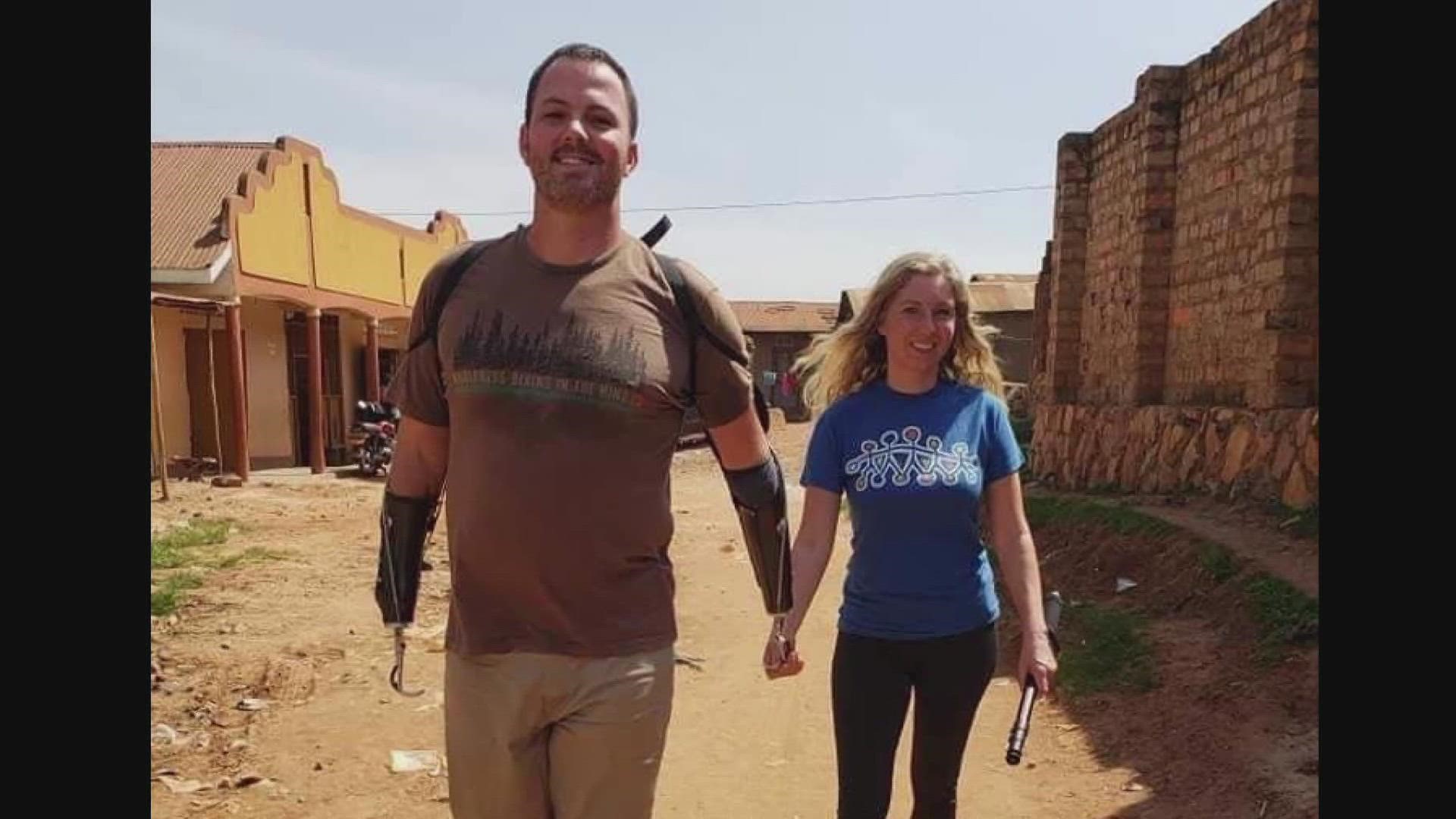VASHON, Wash. — Now retired, U.S. Marine Corps Sgt. James "Eddie" Wright lives with a constant reminder of what happened 18 years ago in Iraq.
In 2004, Wright's platoon was ambushed and attacked in Iraq. Wright lost both of his hands but credits a nonprofit's support in his recovery.
He was awarded the Bronze Star for his actions that day.
There are times when Wright said the ambush attack feels fresh in his memory and then there are other days when it feels like it was a long time ago.
The ambush attack
On April 7, 2004, Wright said his platoon was tasked with a mission that required them to move throughout Al-Fallujah.
"I was struck by a rocket propel grenade fairly early on in the ambush," Wright said. "It took my hands and it almost took my leg from me. So I had a severe injury to my leg, an open fracture with my femur."
Despite losing both his hands just moments ago, Wright said he remained calm.
"Though I couldn't pull the trigger, I knew that I was still in the fight. I could still communicate to the Marines around me," Wright said. "I could still understand what we need to do to survive.”
His "will to fight through it" and combat trauma training kicked in.
"We were still fighting back and still trying to get tourniquets on each other and help each other out," Wright said.
Wright's commander died from his injuries and was awarded the Navy Cross for his actions.
"Really what he did, he saved my life and saved other Marines," Wright said.
The severely injured Marines continued to fight and get out of the kill zone.
Wright remembers being flown to a field hospital in Iraq. He would make several more stops at other hospitals during the following week and a half.
“I woke up nine days later in Washington, D.C.," Wright said. "They had to put me in an induced coma and then I almost didn't make it a few times. They had to resuscitate me.”
Path to recovery
Wright first spent time recovering at the Bethesda National Naval Medical Center before he was moved to Walter Reed Army Medical Center. His injuries and treatment occurred several years before the two military flagship hospitals combined into one.
After another three months at Walter Reed as an inpatient, Wright said he was moved out of campus to a place called the Malone House. It was a place for patients that still needed to be nearby for several daily appointments.
Wright was learning how to live without his hands and how to use prosthetics. He needed daily help. At the time, his mother was living in Ireland, and while she flew in to help, it was costly for her to stay in a hotel in the U.S. and be away from work long term.
One day while on campus, that financial burden was lifted.
Semper Fi and America's Fund
About a year before the ambush attack in Al-Fallujah, the Semper Fi & America’s Fund (The Fund) was started by military spouses who immediately volunteered to provide bedside support to those wounded and injured while serving in Iraq and Afghanistan.
Wright was walking with his mother on the hospital campus when two women approached him with a check and a message from The Fund.
"I couldn't believe it," Wright said. "I've never seen any generosity like that before. It's funny to say but to have these women come up and just be so friendly and this organization I'd never heard about the time, it felt like immediately, I was a part of that family, too. That's a strange thing."
The Fund was founded by Karen Guenther, a registered nurse and spouse of an active duty Marine, along with a determined group of military spouses, Annette Conway, Sondria Saylor, Helen Toolan, and Karen Kelly.
Looking back, Wright said the help from The Fund was life-changing and will always be a part of how he was able to recover and push forward to his longstanding goal to be a Marine.
After about 14 months of recovery, Wright returned to active duty for about a year and taught martial arts at the Marine Corps Martial Arts Center in Quantico.
He became the first ever double amputee to serve in active duty.
"I see what they've been able to accomplish," Wright said. "Just two people with good intentions and an idea and now they've been able to do great things."
According to The Fund's website, the organization is operated by the same founding military spouses and now includes a nationwide staff of veterans, community members, and volunteers.
Sgt. Wright's current mission
"I have a passion to help out veterans because I'm a veteran," Wright said. "I've been blessed with having a resilient attitude and the positive attitude."
Wright told KING 5 he wanted to share his story so that other veterans could look into resources such as The Fund and find the support they need.
"I see how war and how these things affect us and I see how it affects our families and friends who unfortunately aren't with us today," Wright said.
For example, Wright said the family support services and transition services through The Fund are helpful. He said there is more to helping veterans than financial assistance and that mental health and overall wellness need to be priorities.
Most of all, Wright wants his fellow veterans to know they are not alone in their fight after service.
“You can have a camaraderie in a sense of purpose outside of the military," Wright said. "You have to open your mind up to different types of camaraderie and purpose.”

